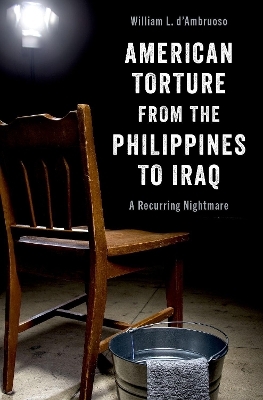
American Torture from the Philippines to Iraq
A Recurring Nightmare
Seiten
2022
Oxford University Press Inc (Verlag)
978-0-19-757032-6 (ISBN)
Oxford University Press Inc (Verlag)
978-0-19-757032-6 (ISBN)
What explains the United States' persistent use of torture over the past hundred-plus years? Not only is torture incompatible with liberal values; it is also risky and frequently ineffective as an interrogation method.
In American Torture from the Philippines to Iraq, William L. d'Ambruoso argues that the norm against torture has two features that help explain why liberal democracies like the United States have continued to violate it. First, the norm against torture paradoxically contributes to the belief that torture works. In naming certain behaviors as appropriate, norms also define what is inappropriate. Some policymakers and soldiers believe (not always unreasonably) that in the nasty world of international politics, cheaters--those who are willing to break the rules--have an advantage, especially in security matters. "Bad" becomes "good" because it appears effective, and rule-following is perceived as naïve and dangerous. Second, the anti-torture norm is not sufficiently specified to draw a definitive line between norm-compliant behavior and violations. For example, it is impossible to specify exactly how many hours must pass before forced standing becomes torture. As a result of torture's blurry definition, perpetrators can justify their actions by suggesting that the adversary is guilty of worse behavior, by using euphemisms such as "enhanced interrogation," or by flatly denying that an act is torture. In short, lack of specificity leads to justifications and redefinitions, which in turn enable transgressions. Drawing on previously overlooked archival testimony from the Philippine-American War (1899-1902), the Vietnam War, and the post-2001 war on terror, d'Ambruoso shows that the rationale for using torture has remained remarkably consistent throughout the past century.
In American Torture from the Philippines to Iraq, William L. d'Ambruoso argues that the norm against torture has two features that help explain why liberal democracies like the United States have continued to violate it. First, the norm against torture paradoxically contributes to the belief that torture works. In naming certain behaviors as appropriate, norms also define what is inappropriate. Some policymakers and soldiers believe (not always unreasonably) that in the nasty world of international politics, cheaters--those who are willing to break the rules--have an advantage, especially in security matters. "Bad" becomes "good" because it appears effective, and rule-following is perceived as naïve and dangerous. Second, the anti-torture norm is not sufficiently specified to draw a definitive line between norm-compliant behavior and violations. For example, it is impossible to specify exactly how many hours must pass before forced standing becomes torture. As a result of torture's blurry definition, perpetrators can justify their actions by suggesting that the adversary is guilty of worse behavior, by using euphemisms such as "enhanced interrogation," or by flatly denying that an act is torture. In short, lack of specificity leads to justifications and redefinitions, which in turn enable transgressions. Drawing on previously overlooked archival testimony from the Philippine-American War (1899-1902), the Vietnam War, and the post-2001 war on terror, d'Ambruoso shows that the rationale for using torture has remained remarkably consistent throughout the past century.
William L. d'Ambruoso is a fellow with the International Security Program and the Project on Managing the Atom at the Belfer Center for Science and International Affairs in the Kennedy School of Government at Harvard University. He previously taught courses on wartime violence and international security at Bates College.
Chapter 1: Torture and the Norm against It: Undying Rivals
Chapter 2: Liberal-Democratic Torture: Answered and Unanswered Questions
Chapter 3: The Search for "Nasty" but "Safe" Interrogation Methods
Chapter 4: Justifying Torture in the Philippine-American War
Chapter 5: The Roots and Rationalizations of U.S. Torture in Vietnam
Chapter 6: Twenty-First Century Torture: The War on Terror
Chapter 7: Conclusion
| Erscheinungsdatum | 22.12.2021 |
|---|---|
| Verlagsort | New York |
| Sprache | englisch |
| Maße | 240 x 164 mm |
| Gewicht | 503 g |
| Themenwelt | Sozialwissenschaften ► Politik / Verwaltung ► Europäische / Internationale Politik |
| ISBN-10 | 0-19-757032-1 / 0197570321 |
| ISBN-13 | 978-0-19-757032-6 / 9780197570326 |
| Zustand | Neuware |
| Haben Sie eine Frage zum Produkt? |
Mehr entdecken
aus dem Bereich
aus dem Bereich
Studienbuch
Buch | Hardcover (2023)
De Gruyter Oldenbourg (Verlag)
CHF 62,90
erfolgreiche Interessenvertretung durch Prozesskompetenz im komplexen …
Buch | Hardcover (2023)
Wiley-VCH (Verlag)
CHF 58,75


